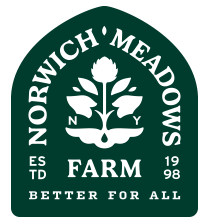Soil Health

Healthy Soil for Healthy Food
Growing healthy plants and producing healthy, delicious food depends on maintaining and continually improving the health of the soil. At Norwich Meadows Farm we combine our team’s years of experience with the best current science, and our farming systems enhance soil organic matter and overall soil health over time.

What Makes Healthy Soil
Our organic farming practices, including the use of cover cropping, reduced tillage, crop rotation, and composting, contribute to resilient, abundant soil, making them a vital tool for soil conservation and safeguarding our food system's foundation.

Characteristics of Healthy Soil
Healthy soil features aggregates that prevent erosion and runoff, higher water retention for drought tolerance, increased microorganisms for disease resistance, and elevated mineral and nutrient content for plant nutrition. However, global topsoil is dwindling, with less than 60 years of farmable topsoil left, according to the United Nations.

Healthy Soil is Alive
Healthy soil is rich in biological activity like bacteria, fungi, algae, protozoa, and nematodes. These microorganisms contribute to plant health by producing natural antibiotics, aiding nutrient absorption, and forming organic matter, a key soil health indicator.

Continual Improvement
To assess and continually improve soil health on the farm, we work with the New York Soil Health lab at Cornell University, which recently found that soils on our farm scored 80 for overall soil health, on a scale of 100, compared to an average of 50 for other New York farms with comparable soil types and cropping systems. Soil organic carbon on our farm was measured at 2.4 on a scale of 0-4, compared to an average of 1.8 for other comparable New York farms.
Organic farming practices contribute to resilient, abundant soil, making them a vital tool for soil conservation and safeguarding our food system's foundation.

Cornell University Soil Testing

